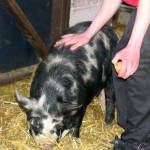Pet Advice Guides for Pet Owners
Keeping pigs
Pigs are companionable and relatively easy animals to have around and it’s scandalous that they are still factory farmed and badly treated in the U.K. Their needs, like most animals, are suitable food, fresh air and freedom. They should not be kept shut up in cramped conditions or on concrete indoors. Sadly this is the fate of most pigs in the U.K. today.
Pigs love to root around and they make excellent gardeners, if you want some ground cleared, a pig will do it for you. Pigs have a long history of association with humans, they are intelligent and always recognise the voice of ‘their’ people, they readily respond to kindness.
Pigs will ‘talk’ to you much as a dog will and become very affectionate with their carers, a pet pig will run to meet you and will hold his or her face up for a kiss.
These are very clean animals and easy to house-train (see previous article). They do not smell at all, except when kept in cramped factory farmed conditions – humans would smell just the same if crammed in a shed. Pigs do like to dig in the ground, they are looking for weeds and roots and things to eat – there won’t be any invasive couch grass in the pig paddock.
Because they don’t have any sweat glands they keep cool in hot weather by rolling around in the mud (a bit like a hippo!). If a light coloured outdoor pig doesn’t take a mud bath and it’s a sunny day you will have to help him out – either pat on some mud or fetch the sunscreen. Pigs get sunburnt very easily.
The more land you can provide for your pig, the better he will do. Woodland is the best environment of all, it’s natural for a pig to live among trees and he will love it, turning all the leaves over and looking for grubs and tubers. Do pigs dream of truffles? I’m sure of it.
Pigs will eat just about anything so all your left overs and garden waste are munched up with great appreciation. Pigs love their food and it’s a pleasure to watch them eat – yum, yum, yum! You can’t give them swill any more but you can buy a ready made mix at your local fodder merchant. We tend to get a sack of ‘sharps’ which is ground up wheat and is a bit cheaper. It’s not a complete feed though and you need to add protein but it does make a bigger feed and you can make a lovely mash with some scraps and left over milk or just water. Pigs don’t need so much of the ready made pig nuts and gobble their ration down in a few minutes and then say ‘more please’. A bigger mash is a lot more satisfying.
Pigs need a nice comfy bed of straw in their pen or house, they’ll tramp it down into shape and will never soil it. Pigs like a siesta and are good sleepers at night, I’ve never known a pig with insomnia unless you forget to feed him that is, then there would be loud complaints.
These good natured animals have a body that is more like the human one than any other creature. Sadly, this is why they are used in experiments and their body parts are given to humans – in heart surgery for example.
Pigs are easy to train, possibly more so than dogs or cats. We have often raised orphan piglets on a baby’s bottle and they develop a real bond and like to be nursed – it’s a bit tricky when they grow up and 20 kg of pig wants to jump on your knee so we substitute tummy tickling instead. A boar pig we once reared from a day old liked to come in the kitchen as soon as we were home and always rolled over on the floor for us to tickle him, once this ritual was over and we’d all said hello and he’d had a digestive biscuit, he’d trot off back to his paddock.
Once a pig knows where home is, you can let him out and he’ll just potter around the place looking for scraps and anything interesting, just like an old pony. We’ve never had a pig that wanted to run away, on the contrary, they are very sociable animals and come to call – they mostly try to get in the house!
Pigs get on with other animals although some horses are very scared by them at first. Once they all know one another, the pigs are part of the family. Cats sometimes curl up with them as they like the warmth.
A pig who is stressed by being kept in cramped and unnatural factory farmed conditions will be a different creature though. When we have, in the past, rescued these pigs, they have been difficult to handle. Mostly a factory farmed pig will go for slaughter – a short life, a cruel death and then plastic packed on the shelves at the supermarket. This is the fate of the majority of pigs today. If you are going to buy pork, bacon or sausages, please make sure it is from outdoor reared pigs. The fastest way to change the world for the pigs is in our shopping basket.


